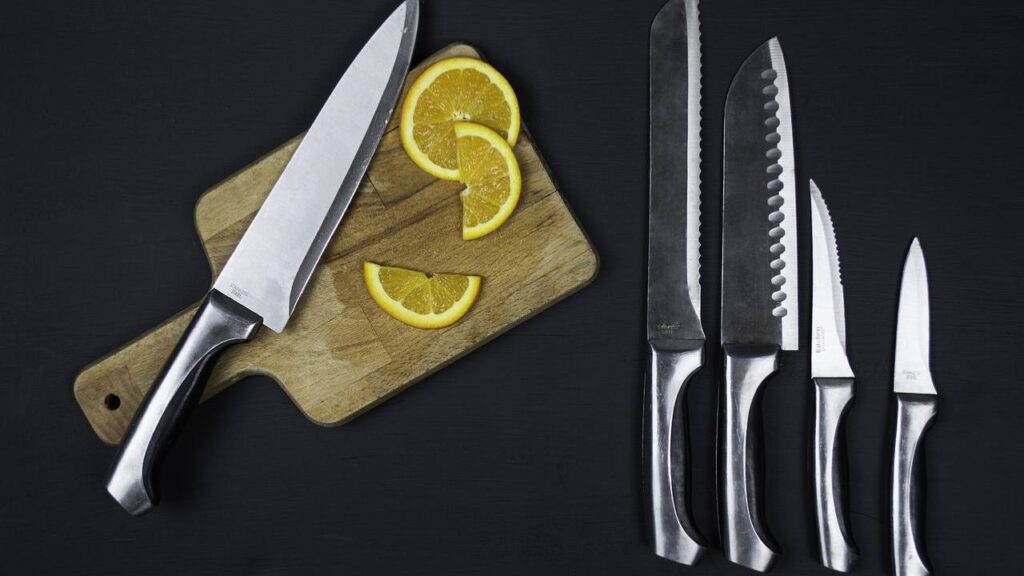When preparing meals, having the right tools makes the process smoother, safer, and more enjoyable. One of the most essential tools in any kitchen is a knife. But what knife is commonly used in the kitchen, and how do you know which ones are necessary for everyday cooking? In this guide, we’ll dive into the seven must-have kitchen knives, explaining their uses, benefits, and why they are indispensable in both home and professional kitchens.
With this knowledge, you’ll be equipped to tackle any recipe confidently and efficiently.
What Knife is Commonly Used in the Kitchen?

1. Chef’s Knife: The Essential All-Rounder
When asking what knife is commonly used in the kitchen, the chef’s knife always comes up first. It’s the most versatile knife, suitable for various tasks like chopping, slicing, and dicing. With its wide blade, usually 8-10 inches long, it’s perfect for handling everything from vegetables to meats.
- Uses: Cutting fruits, chopping herbs, slicing meat, and dicing vegetables.
- Why It’s Essential: Its versatility makes it a go-to knife for most cooking tasks. A good chef’s knife can reduce preparation time significantly.
2. Paring Knife: Small but Mighty
The paring knife is a small, precise tool ideal for delicate tasks that require attention to detail. With a blade around 3-4 inches long, it’s perfect for intricate work like peeling and trimming.
- Uses: Peeling apples, deveining shrimp, and trimming vegetables.
- Best for Everyday Cooking: This knife’s precision makes it invaluable for small, detailed tasks that other knives can’t handle effectively.
3. Serrated Knife: The Bread Specialist
A serrated knife is indispensable for cutting through foods with tough exteriors and soft interiors. Its saw-like edge ensures clean slices without crushing delicate items.
- Uses: Cutting bread, slicing tomatoes, and preparing cakes.
- Why It’s Commonly Used: This knife handles textured foods effortlessly, making it a must-have for home bakers and cooks alike.
4. Utility Knife: The Versatile Option
The utility knife falls between a chef’s knife and a paring knife in size, making it ideal for tasks that require precision but aren’t as small-scale as those suited for a paring knife.
- Uses: Slicing sandwiches, trimming meats, and cutting smaller vegetables.
- Why It’s Useful: Its mid-size blade offers flexibility, making it an excellent all-purpose knife for everyday cooking.
5. Boning Knife: For Meat Preparation
For anyone who works with meat regularly, a boning knife is crucial. Its thin, sharp blade is designed to cut close to the bone, making deboning and trimming easy.
- Uses: Removing bones from chicken, filleting fish, and trimming fat.
- Best for Everyday Cooking: A boning knife reduces waste and helps prepare cleaner cuts of meat.
6. Santoku Knife: Precision Cutting
The Santoku knife, originating from Japan, is similar to a chef’s knife but has a shorter, straighter blade. It’s designed for precision and is ideal for thin slicing and fine chopping.
- Uses: Slicing fish, cutting vegetables, and chopping nuts.
- Why It’s Popular: Its lightweight design and sharp edge make it easy to handle, especially for detailed tasks.
7. Cleaver: The Heavy-Duty Tool
A cleaver, with its large, rectangular blade, is perfect for heavy-duty tasks like cutting through bones and tough vegetables. While it’s less commonly used for delicate work, it’s indispensable for specific tasks.
- Uses: Chopping bones, slicing thick cuts of meat, and smashing garlic.
- Why It’s Essential: Its strength and durability make it a valuable addition to your knife collection.
Types of Kitchen Knives and Their Uses: A Handy Comparison

| Knife Type | Key Uses | Ideal For |
|---|---|---|
| Chef’s Knife | Chopping, slicing, and dicing | Versatile tasks in everyday cooking |
| Paring Knife | Peeling and precision cutting | Small, intricate tasks |
| Serrated Knife | Cutting bread and tomatoes | Foods with tough exteriors, soft interiors |
| Utility Knife | Mid-sized slicing and trimming | General-purpose kitchen tasks |
| Boning Knife | Removing bones from meat | Meat preparation |
| Santoku Knife | Precision cutting and slicing | Lightweight, detailed cutting tasks |
| Cleaver | Heavy-duty cutting | Tough meats and hard vegetables |
Benefits of Having Essential Kitchen Knives
- Efficiency: Using the right knife for each task saves time and effort.
- Safety: Proper knives reduce the risk of accidents caused by using the wrong tools.
- Durability: High-quality knives last longer and provide consistent performance.
What Knife is Commonly Used in the Kitchen? A Practical Answer
The chef’s knife is the most common knife used in the kitchen due to its versatility. However, combining these seven essential knives allows you to handle any cooking task efficiently, from delicate peeling to cutting through tough bones. Whether you’re a beginner or an experienced cook, having the right knives enhances your cooking experience.
How to Choose the Best Knives for Your Kitchen
When selecting knives, keep these factors in mind:
- Blade Material: Stainless steel offers rust resistance, while high-carbon steel provides a sharper edge.
- Handle Comfort: Ergonomic handles improve grip and reduce hand fatigue.
- Maintenance Requirements: Choose knives that are easy to sharpen and clean.
Conclusion
Knowing what knife is commonly used in the kitchen and understanding the role of each essential knife is key to improving your cooking skills. While the chef’s knife remains the go-to tool, each of the seven knives discussed here plays a crucial role in making meal preparation easier, safer, and more efficient. By investing in high-quality knives, you’ll have the confidence to tackle any recipe and elevate your everyday cooking experience.
FAQ’s
What knife is commonly used in the kitchen?
The chef’s knife is the most commonly used kitchen knife due to its versatility. It’s perfect for chopping, slicing, and dicing various ingredients.
What are the essential knives for everyday cooking?
Essential knives include the chef’s knife, paring knife, serrated knife, utility knife, boning knife, Santoku knife, and cleaver. Each serves a unique purpose in the kitchen.
How do I maintain my kitchen knives?
To maintain your knives, regularly sharpen them, wash them by hand, and store them properly in a knife block or magnetic strip.
What are the benefits of using high-quality kitchen knives?
High-quality knives are more durable, safer to use, and make cooking tasks faster and more efficient.
Are wooden cutting boards better for knives?
Yes, wooden cutting boards are gentler on knife edges, helping to maintain their sharpness and prolonging their lifespan.


3 thoughts on “Discover the 7 Essential Kitchen Knives You Need for Everyday Cooking”